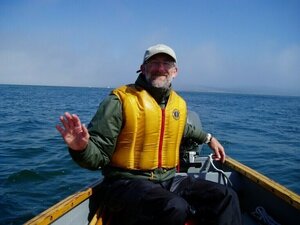ND Energy Faculty Luncheon Seminar: "Challenges to Ecosystem Management and Engineering Design in a Rapidly Changing Midwest Environment" by Alan F. Hamlet
Please join ND Energy for the Spring Faculty Luncheon Seminar Series focused on specific research topics with talks by Notre Dame faculty, followed by an inspiring and stimulating exchange of ideas, while exploring new directions for cross-collaborations. All interested faculty are welcome to attend.

This month, we are delighted to feature a talk by Alan F. Hamlet, titled "Challenges to Ecosystem Management and Engineering Design in a Rapidly Changing Midwest Environment" on Thursday, March 28, at 12:30 p.m. in B01 McCourtney Hall. Please RSVP to the Google calendar invitation by 10:00 a.m. Tuesday, March 26, to help us prepare for enough lunches. If you did not receive an invitation or have questions about the seminar, please contact Dr. Subhash L. Shinde, ND Energy Associate Director.
Abstract
Climate change is expected to bring profound changes in temperature and precipitation to the Midwest region. Increases in temperature will likely affect all seasons, affecting aquatic and terrestrial ecosystems, agriculture, heat waves in urban areas, and energy demand. Increases in precipitation are projected by most global climate models for fall, winter, and spring. Summer precipitation projections suggest relatively little systematic change overall, but precipitation extremes (e.g. extreme convective storms) are projected to increase in summer regardless of wetter or drier conditions overall. Loss of snow cover in winter and accompanying increases in cool-season surface runoff will likely impact aquatic ecosystems via increases in nutrient runoff and increases in the risk of flooding in many Midwest watersheds. Changes in extreme precipitation are already evident in many parts of the Midwest and Southern Canada, and have had devastating effects on a number of cities, where currently more than 80% of the population live. Ecosystem management challenges in the Midwest will be widespread under climate change. This talk will focus on three representative case studies in the Midwestern U.S. addressing biogeochemical changes in small northern lakes, increasing nutrient losses from agricultural watersheds, and projected changes in groundwater recharge, temperature, hydraulic conductivity, and associated baseflow conditions in rivers. Engineering challenges associated with climate change will also be widespread and varied, but this talk will focus on the central problem of assessing future risks for existing water infrastructure in a non-stationary environment, and determining appropriate risk-based design standards for new water infrastructure. A case study evaluating the performance of the ND hydropower plant under climate change projects increasing flows, and opportunities to increase hydropower capacity over time, especially in winter. Lastly, the talk will report briefly on current research efforts to address the very formidable problem of coping with emerging precipitation “ultra extremes,” which affect flood risk in both urban stormwater systems and rivers.
Biography
Dr. Alan F. Hamlet is an Associate Professor in Civil and Environmental Engineering and Earth Sciences at the University of Notre Dame. He is a specialist in the integrated computer modeling of climate, hydrologic systems, water resources systems, and ecosystems. These activities include construction of historical hydrometeorological data sets, statistical and dynamic downscaling of climate model output, large- and small-scale hydrologic modeling of surface and groundwater systems, analysis of hydrologic extremes (floods, droughts), water resources modeling (simulation and optimization of reservoir operations), and ecosystem modeling of the coastal ocean, rivers, estuaries, wetlands, and lakes. Dr. Hamlet has also participated in modeling studies of regional energy systems, agricultural systems, as well as urban heat-related deaths stemming from changing temperature and humidity regimes. The tools employed in these diverse research activities can be readily applied at local- to global-scales to suit a wide range of integrated applications analyzing both natural and human systems. Over the last 25 years Dr. Hamlet has been involved extensively in integrated modeling studies in North America (e.g. in the western, central, and southeastern U.S.) as well as at the global scale. Recent large-scale efforts include climate change impacts assessment for the entire Midwest and Great Lakes region, and scenarios supporting the Indiana Climate Change Impacts Assessment [https://ag.purdue.edu/indianaclimate/].